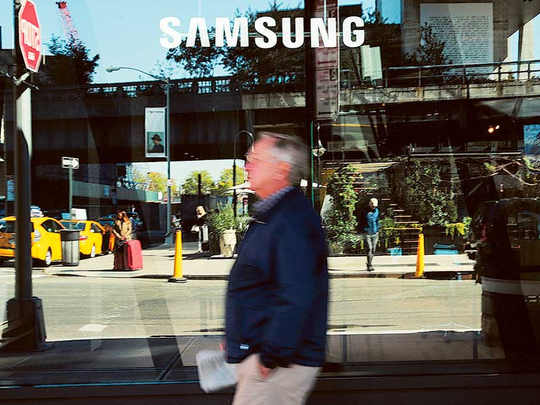
Seoul: South Korea’s central bank conceded on Thursday that Samsung Electronics Co Ltd’s smartphone crisis could potentially hamper economic growth, but largely maintained its view that the country’s recovery is still on track.
After the Bank of Korea kept interest rates unchanged at 1.25 per cent in a unanimous vote, Governor Lee Ju-yeol said this year’s growth was expected to reach 2.7 per cent, steady with the bank’s last forecast made in July.
“Third quarter growth seems to have met our expectations, and it looks like it won’t be too difficult to obtain our growth forecast,” Lee told a news conference.
The governor explained the bank’s monetary policy board had factored in the gradual economic recovery seen so far, household debt that continues to rise at a swift pace, and a pending rate hike by the US. Federal Reserve.
All but one of 24 economists surveyed by Reuters had expected the BoK to leave the policy rate at its record low 1.25 per cent as board members weighed the risks to household indebtedness from further rate cuts.
As markets expected, next year’s growth forecast was revised down to 2.8 per cent from 2.9 per cent.
Lee said the bank needed more time to assess the effects that Samsung Electronics’ scrapping of its fire-prone Galaxy Note 7 premium smartphone would have on the economy.
Samsung’s problems were calculated into Thursday’s revisions to the BoK’s economic forecasts that include growth and inflation rates, he said, but the bank was not able to reflect the most recent changes because of time constraints.
Company ratings unaffected
Standard & Poor’s Global Ratings on Thursday said that its ratings on Samsung Electronics are not affected by the company’s recent decision to discontinue production of the smartphone.
“We believe the impact on the ratings will be limited at this stage mainly because of SEC’s significant net cash holdings of about 65 trillion won (Dh210 billion, $58.3 billion) as of June 30, 2016, and strong operating cash flow,” S&P said in a statement.
However, it said the issue would hurt Samsung’s operating performance for the next few quarters.
Also on Thursday, Moody’s Investors Service said the production halt and recall are “credit negative”, but the company’s “strong financial profile” continues to support its rating.
Samsung Electronics isn’t the only big Korean company with woes. Workers at the largest automaker Hyundai Motor Co have been striking since July, denting the country’s exports.
Lee Sur-bee, fixed income analyst at Samsung Securities, said it “remains to be seen what Samsung or the [industrial] strikes will materialise into.” “For example, if the Note 7 debacle does turn into an export crisis, we will know by early 2017 and the Bank of Korea can turn dovish again then.” The BoK’s policy board has taken a more hawkish tone of late compared to previous months, as household debt surged and annual inflation in September accelerated to 1.2 per cent, its highest in seven months, on a recovery in consumption and a jump in some fresh food prices.
The bank has also emphasised the diminished effects that rate cuts can have on the economy compared with previous years because of structural factors such as an ageing population and a rigid labour system.












